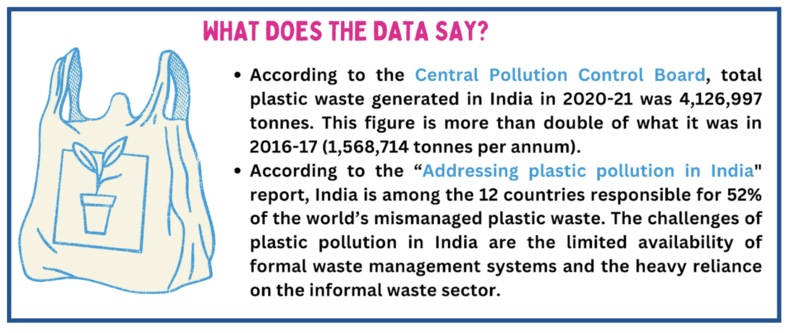As crisis grows, time to revisit plastics policy
Relevance: GS III (Environment)
- Prelims: Pollution; Government Initiatives for preventing Plastic Pollution;
- Mains: Environmental Governance and Associated challenges;
Why in the News?
The implementation of the Plastic ban is a complex issue that requires addressing the concerns of various stakeholders, promoting alternatives, and ensuring effective enforcement and compliance.

About:
- Plastic pollution is a serious health hazard that is reaching epic proportions. Plastic is a synthetic polymer produced from petrochemicals and is non-biodegradable in nature.
- Discarded plastic items often find their way into terrestrial and aquatic ecosystems where they affect wildlife. Polythene bags dumped in landfills are often ingested by animals who mistake it for food.
- Discarded plastic breaks down into micro plastics which are ingested by living organisms and accumulate and amplify in the food chain, all the way up to our platter.
- Of particular concern are disposable or single-use plastic items since they are produced in large quantities and are discarded as soon as they are used.
-
- These include polythene bags, plastic glasses, potato wafer packets, sachets, straws and plastic bottles.
- Plastic bans of some kind exist in many countries around the world.
- However, implementation of the ban is the real challenge, as is course correction through feedback mechanisms. Plastic pollution is a global crisis and innovative solutions are emerging to tackle the plastic waste crisis.
Government Initiatives:
- Concerned with the ever-increasing plastic waste and its impact on the environment, the Government of India banned many single-use plastic items in 2022.
- The Plastic Waste Management Amendment Rules 2021 prohibit more than a dozen single-use plastic items which have low utility and high littering potential.
- These include items like plastic cutlery, straws, earbuds, ice cream sticks, invitation cards and cigarette packs.
- In addition, minimum thickness of permissible polythene bags has been increased to 120 microns so that they can be reused.
- The initiative to curb the plastic menace by banning specific single use plastic items is timely. Plastic bags of some kind exist in many countries around the world.
Implementation is a major challenge:
- Implementation of the ban is the real challenge in India, as is course correction through feedback mechanisms.
- A recent report on the single-use plastic ban across five Indian cities by the Delhi-based Toxics Link organization found that more than 50% of surveyed locations continued to sell banned single-use plastic items.
- The report titled Single-use Plastic Ban in India (2023) mentions polythene bags to be the most abundantly found among banned plastic items across all surveyed cities.
- Issue with Ban on Single-use of Plastic:
-
- Another report on the implementation of Single-use plastic ban in India 2023 report by the Centre for Science and Environment highlights the need to enforce the ban at the source of production. It also questions the exclusion of other single-use plastic items from the ban.
- Single-use plastic items like potato wafer bags, plastic water bottles, milk packets and shampoo sachets are not included in the list of banned items. Allowing the use of polythene bags above 120-micron thickness is yet another limitation of the ban.
- Issue with thicker polythene bags:
- The thickness of polythene bags is not immediately apparent and the resulting confusion promotes use of all types of polythene bags.
- The thicker polythene bags are allowed so that they can be used more than once. However, this is often not the case and even when they are reused, they are soon discarded. Keeping them outside the purview of the ban is only adding to the plastic waste burden.
|
BEYOND EDITORIAL: What are other challenges in implementing plastic bans in India?
Need for Strategizing and Understand Priorities (Way Forward):
|
Conclusion:
These innovative solutions address different aspects of the plastic waste crisis, from recycling and reusing plastic to developing alternative materials and promoting sustainable waste management practices
Mains PYQ
Q. Enumerate the National Water Policy of India. Taking river Ganges as an example, discuss the strategies which may be adopted for river water pollution control and management. What are the legal provisions of management and handling of hazardous wastes in India? (UPSC 2013)
Q. "The most significant achievement of modern law in India is the constitutionalization of environmental problems by the Supreme Court." Discuss this statement with the help of relevant case laws. (UPSC 2022)


